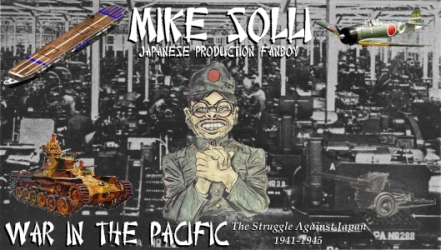ORIGINAL: LoBaron
I am always a bit surprised about posts concerning the China theatre of operations.
The general consensus seems to be that in case the Japanese player puts enough force behind a China
attack, he will steamroll the Allies with little to no chance of counter.
The quote is just an example (chosen at random, simply because it was the last I have read)
The Chinese can not stop the Japanese troops in stock, why make it worst. The most unpleasant part of this game is playing as Allies against a determined Japanese foe in China. I just lost 1 1/2 years of inf/support squad production in one battle in a city.
My answer to this post would be something similar to what I write below:
I can´t fail to notice that most Allied players overwhelmed in China seem to think
its vitally important to defend in cities, or to counterstack against enemy stacks.
In our (vanilla) PBEM Rob uses terrain to his advantage, blocks road hexes, threatens flanks, and is able
to keep a frontline which can only be penetrated by using such a mass of forces that he could exploit
a neccesary weakness on other parts of the frontline.
The trick is to pull back into defensible positions. Not to pull back into positions you are forced to.
Bottom line is:
Yes, I believe the Japanese player can steamroll China if he diverts enough ressources.
But against an opponent who fights like, or similar to Rob, he has to divert more ressources
than just the Kwantung army, and this investment will really hurt him on other fronts.
Is this assumption wrong?
Whats the veteran´s assessment on this topic at the moment?
Using terrain, counterattacks, flanking,...can the Allied player hold his own without implementing
HR´s other than bomber limitations?
No, you assumption is not wrong. My experience is with scen#2 which allows greater resources to the Japanese player and our game started when AE was new and there were some serious issues that benefited the Japanese player which allowed for a great head start. (The most serious was a bug where a massed stack could cross a river hex with only one unit in the stack taking the effect of the shock attack). In our game my oppoennt had to pay PP to move any units from Manchuria into China and we have not had strategic bombing in China. (I think before 1944 but neither of us have done it)
I have faced a very good opponent but am experienced myself. It has been a hard fought campaign and in 3/44 my opponent has finally captured Chungking. I still hold three or four cities around Lanchow, which I expect will fall within the next few months as the forces around Chungking are now free. I still hold two cites west of Kumming leading into Burma and have just opened a corridor to China which is helping a little bit with what has been a pitiful supply situation. I would say the Chinese army is at about 40% of the strength that is stated the war with but is still a strong force.
I am very happy with my efforts and never made what I consider a critical mistake. I really think I did the absolute best to hold off his onslaught but don't think there is anyway I could have prevented the loss of the Chinese captial. The loss of China gives a Japanses player a tremendous benefit as it frees up a lot of troops that can be deployed elsewhere.
If we were playing the stock scenario, then yes, I could have held out longer and there is a good possibility that I might not have lost the captial (this is the key to China) as Ark would not have been as strong in other place. Still, I would say that with PDU on and Japanese control of production, a good Japanese player should be able to take Chungking. The reasons are as follow-and I will in addition list problems that have been corrected.
1. Total Japanese control of the air. With the extra aircraft that Japan get vs the pitiful replacement rate and critical supply situation. There really is no chance for the Allies to fight in the air.
2. Commitment of the Kwantung army. A lot more troops. I have always said that I would like to see a small random chance of Soviet activation with the removal of troops from Manchuria with the chance being very small but increasing with the greater AV pulled out. As it is now with a defined limit, the Japanese player has too much control over the units in Manchuria and suffers no risk.
3. Early issues that have now been addressed (river shock and artillery).
4 The supply flow issue making it virtually impossible to defend about 60% of the cities. These bases should be an asset in any Chinese defense line. Instead they are a liability because any units located in them will soon run out of supply.
5. Chinese replacements. I had at one point a couple of thousand or more Chinese squads in my pools but Chinese units would not take replacments due to critical supply issues. The only solution was to pay dear PP and move fragmented units to India so I could rebuild them.
6. The Chinese reinforcment issue. In theory a good idea where destroyed Chines units would come back in Chungking at 1/3 strength. In practice not so good as good Japanese player will avoid surrounding and destroying Chinese units. Instead it is best to just grind them down to useless fragments and keep pushing them back.
7. The Northern exposure problem. My opponent was able to break through the bottle neck in the north to the east of Lanchow and then using armor take out every Northern city while operating over a road supply line that extened over 1,000 miles. Supply never seemed to be an issues. (This one still makes my stomach turn). I just assumed that working over a supply line that long would have been impossible. Turns out I was wrong.
In the end it comes down to the players. An average or green Allied player can make a big mistake and lose China very fast. A good player (and I think I am pretty good) can probably defeat an average Japanese player in China. However, I don't think that there are enough options to stop a good Japanese player from taking out China if he is willing to devote the resources to it. And, I think the rewards for taking China out are well worth it.
One last point. In mid campaign, my opponent Viperpol, very gracefully agreed to not try to not impeed my attempts to resupply via air transport over the hump. Considering his strong presence in Burma and total control of the air over China and in Burma for most of 1943, to go after my transports and their bases would have been an obvious tactic and I suspect would have ended the Chinese campaign 4-6 months earlier for him-and would have cut a clear path through to Burma from China which would have cause me a great deal of trouble in Burma. So without this generous concession from him, I would have faced disaster. This probably should be in any HR where China is concerned.
My two cents.
I am the Holy Roman Emperor and am above grammar.
Sigismund of Luxemburg












